 September 2024 in “Pakistan Journal of Science”
September 2024 in “Pakistan Journal of Science” Laser treatments, especially low-level laser therapy, can improve hair growth, but more research is needed.
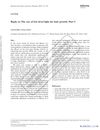 10 citations,
January 2010 in “Journal of cosmetic and laser therapy”
10 citations,
January 2010 in “Journal of cosmetic and laser therapy” The letter criticizes a study's methods and small size, suggesting larger, better-designed research would show low-level light therapy effectively grows hair.
 8 citations,
October 2018 in “Journal of The American Academy of Dermatology”
8 citations,
October 2018 in “Journal of The American Academy of Dermatology” The review suggests there's no agreed treatment for Frontal Fibrosing Alopecia, but hydroxychloroquine and 5a-reductase inhibitors are most effective. New treatments like platelet-rich plasma and LED light could help if standard treatments fail.

Low level laser or LED therapy combined with infiltrations may help hair growth.
1 citations,
December 2020 in “Medical lasers” The laser therapy device effectively increased hair growth in people with androgenetic alopecia.

Low-level laser therapy is a safe, painless method that effectively treats acne and improves skin without post-treatment care.
 1 citations,
July 2019 in “British Journal of Dermatology”
1 citations,
July 2019 in “British Journal of Dermatology” Minoxidil was more effective than laser therapy for hair loss, and the report also highlighted the need for more research on PRP for a different hair loss condition, the impact of social media on alopecia views, and a warning on turmeric causing nail discoloration.
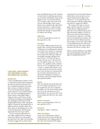 August 2015 in “Advances in Small Animal Medicine and Surgery”
August 2015 in “Advances in Small Animal Medicine and Surgery” Low-level laser therapy may help regrow hair in dogs with non-inflammatory hair loss.
 November 2023 in “Journal of Student Research”
November 2023 in “Journal of Student Research” New treatments like low-level laser therapy, platelet-rich plasma therapy, and micro needling show positive results for hair regrowth in people with genetic hair loss.
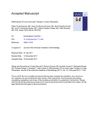 16 citations,
December 2017 in “Journal of The American Academy of Dermatology”
16 citations,
December 2017 in “Journal of The American Academy of Dermatology” Low-level laser therapy may reduce symptoms and increase hair thickness in lichen planopilaris patients.

Low-level laser therapy combined with Neoptide improved hair regrowth better than either treatment alone in rats.
31 citations,
January 2019 in “Frontiers in Veterinary Science” Laser therapy improved surgical scar healing in dogs.
 January 2025 in “Journal of Dermatological Treatment”
January 2025 in “Journal of Dermatological Treatment” Combining low-level laser therapy with minoxidil doesn't improve hair loss treatment compared to using minoxidil alone.
 8 citations,
January 2008 in “Journal of Cosmetic and Laser Therapy”
8 citations,
January 2008 in “Journal of Cosmetic and Laser Therapy” Hair transplantation for men has improved, offering natural, lasting results, and may be enhanced by certain medications and future technologies.
 1 citations,
February 2022 in “Lasers in Medical Science”
1 citations,
February 2022 in “Lasers in Medical Science” Low-level laser therapy is about 80% effective in treating hair loss, with best results in males, those who use it for over a year, and those with scalp conditions like dandruff and rash.
 September 2020 in “International journal of computer science and mobile computing”
September 2020 in “International journal of computer science and mobile computing” Low-level laser therapy can stimulate hair growth and increase hair density, making it a promising treatment for hair loss.
 May 2023 in “Journal of Clinical Medicine”
May 2023 in “Journal of Clinical Medicine” New understanding and treatments for hair loss are improving, but more research is needed.
January 2021 in “International Journal of Research in Dermatology” Combination therapies are more effective for treating androgenetic alopecia than single treatments.

Low-level laser therapy may help uninfected cells but has different effects on coronavirus-infected cells.
 4 citations,
August 2013 in “Expert Review of Dermatology”
4 citations,
August 2013 in “Expert Review of Dermatology” Updated treatments for female hair loss include minoxidil, antiandrogens, hair transplants, and light therapy.
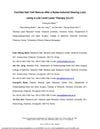
Low Level Laser Therapy may improve noise-induced hearing loss.
 11 citations,
September 2013 in “Journal of the Egyptian Women's Dermatologic Society (Print)”
11 citations,
September 2013 in “Journal of the Egyptian Women's Dermatologic Society (Print)” Various treatments exist for hair loss, but more research is needed for better options.
 10 citations,
January 2010 in “PubMed”
10 citations,
January 2010 in “PubMed” Adjuvants, diet changes, and laser therapy may improve male pattern hair loss.
 81 citations,
July 2011 in “Lasers in Medical Science”
81 citations,
July 2011 in “Lasers in Medical Science” The Lexington LaserComb helped regrow hair in mice with a condition similar to human hair loss.
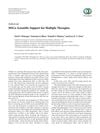 13 citations,
January 2015 in “Stem cells international”
13 citations,
January 2015 in “Stem cells international” Mesenchymal Stem Cells (MSCs) are promising for multiple therapies, but more research is needed to fully understand and optimize their use.
 January 2014 in “Cosmoderma”
January 2014 in “Cosmoderma” The document concludes that personalized treatment plans for hair loss in Asian men are necessary and more research is needed to develop effective guidelines.
March 2023 in “Anais Brasileiros De Dermatologia” Topical minoxidil is the best-supported treatment for female hair loss, but personalized plans are needed.
 December 2014 in “Faculty Opinions – Post-Publication Peer Review of the Biomedical Literature”
December 2014 in “Faculty Opinions – Post-Publication Peer Review of the Biomedical Literature” Low-level light therapy significantly increased hair density and thickness in people with hair loss, but they didn't notice a difference.
 1 citations,
July 2023 in “Cureus”
1 citations,
July 2023 in “Cureus” Some treatments for hereditary hair loss are effective but vary in results and side effects; new therapies show promise but need more research.
 14 citations,
October 2020 in “Natural Products and Bioprospecting”
14 citations,
October 2020 in “Natural Products and Bioprospecting” Various treatments, including FDA-approved drugs, natural products, and oral supplements, can help with hair loss, but a patient's medical history and potential allergies should be considered when choosing a treatment.


























